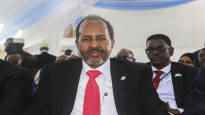Somalia got a president on Sunday that ruled the country earlier, from 2013 to 2017. Hassan Sheikh Mohamud is known as a moderate Islamist with good international relations.
In the Somali capital, Mogadishu, there was a curfew during Sunday’s presidential election and the vote was held in a large tent set up in the airport security zone due to the terrorist threat.
Even on election day, grenades were fired at Mogadishu, but the vote, which lasted from morning to late evening, was carried out.
Noble African correspondent Pasi Toivonen answers eight questions on the Somali elections.
1. What was the election about?
The election was important because its postponement in April last year was already on the verge of Somali civil war. President Mohamed Farmaajo wanted to extend his own term of office for two years.
As the prime minister succumbed to opposition, the country’s army split into supporters of the president and prime minister.
In April last year, the various units of the army were already facing each other with their fingers triggered. Now, one of the most important tasks of the new president is to get the army and other security machinery genuinely on his side.
2. What is the main outcome of the election?
Perhaps the most important thing was that the elections were held. There were a staggering 39 candidates, and in the final round of voting, there was a confrontation between President Mohamed Farmaajo and the ruling Somalia before him. Hassan Sheikh Mohamud.
These gentlemen sat side by side in the counting of votes, and Farmaajo has not disputed the outcome, at least for the time being, which is definitely a good sign.
3. You observed the elections in the Somali part of Nairobi. What was the atmosphere like there?
Here in Nairobi, we were in a Somali restaurant full of young men. Most were supporters of the incumbent president, and they did not miss the victory celebrations.
But they left calmly for the night in Nairobi, and one of my interviewees who supported Farmaaj stated that while the disappointment was enormous, Hassan Sheikh had won the election tonight with his president as well.
4. What is changing in Somalia?
One could say that nothing has changed in Somalia for more than 20 years. Hassan Sheikh faces pretty much the same problems he faced as nine years ago when he first started as president.
And the biggest problem is al-Shabaab, a terrorist organization that dominates much of the country and undermines security in Somalia, so it apparently sounded its own with grenades even on election day, within earshot of the election tent.
Whether Hassan is looking for a tougher confrontation or cooperation with Sheikh al-Shabaab remains to be seen. But if the security situation does not improve, nothing else will move forward in Somalia.
5. What other challenges does the new president face?
The new president is also burdened by a worsening drought that threatens the lives and well-being of millions of people in Somalia. The economy is growing, but it is being exacerbated by corruption and a shaky security situation.
The resigning President Mohamed Farmaajo has pursued a tough centralist policy and has resisted strong Somali states. Whether Hassan Sheikh genuinely agrees to share power with the states is one of many questions of fate.
6. Were the elections free and fair?
There have been no free elections in Somalia since 1969. Yesterday, 329 MPs nominated by influential Somali clans were elected to the presidency.
Of the approximately 17 million Somalis, only a small minority had the opportunity to influence the outcome of the election. There was apparently a lot of money in the election. In his opening remarks, the new president once again promised that Somalia would move towards democratic elections.
7. The election was delayed by more than a year. Why were they kept right now?
The election was eventually held, perhaps because the International Monetary Fund announced it would end its support programs for Somalia unless a new president is elected by 17 May.
8. What was the role of women in the election?
There were a record 39 presidential candidates, but only one of them, Fowsia Yusuf was a woman. Of the 329 MPs who made the election, about one in four were women. There is, in principle, a 30% female quota in Parliament, but some clan leaders are not filling women seats.
As early as 2002, a so-called Sixth Clan was established in Somalia, uniting Somali women across clan borders and trying to improve the status of women. But an estimated two hundred young men, but not a single Somali woman, were present at those election observers in Nairobi.
